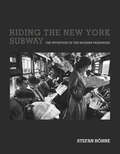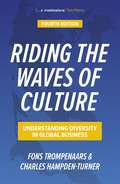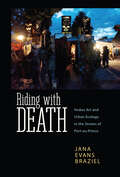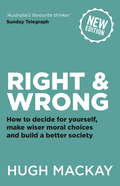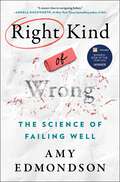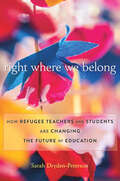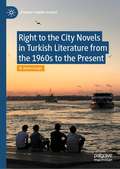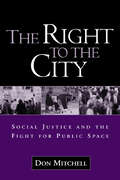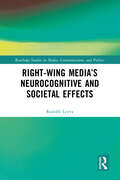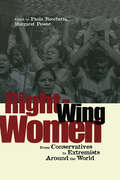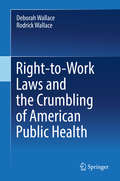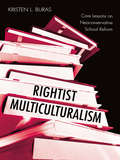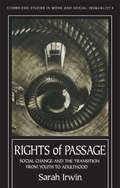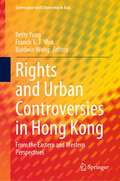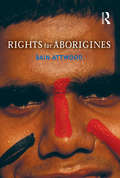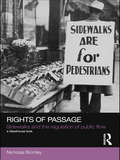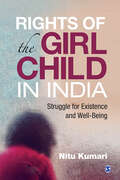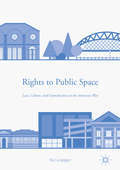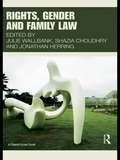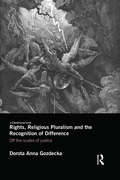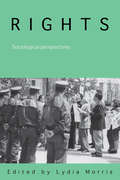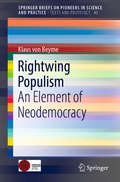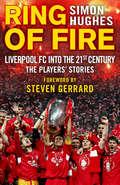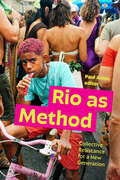- Table View
- List View
Riding the New York Subway: The Invention of the Modern Passenger (Infrastructures)
by Stefan HohneA history of New York subway passengers as they navigated the system's constraints while striving for individuality, or at least a smooth ride.When the subway first opened with much fanfare on October 27, 1904, New York became a city of underground passengers almost overnight. In this book, Stefan Höhne examines how the experiences of subway passengers in New York City were intertwined with cultural changes in urban mass society throughout the twentieth century. Höhne argues that underground transportation--which early passengers found both exhilarating and distressing--changed perceptions, interactions, and the organization of everyday life.
Riding the Waves of Culture: Understanding Diversity in Global Business
by Charles Hampden-Turner Fons TrompenaarsFor over 25 years, Riding the Waves of Culture has set the standard for leading effectively in an international business context. Helping leaders to be highly attuned to cultural differences, and to leverage such differences for maximum competitive advantage.Retaining its in-depth exploration of underlying cultural frameworks that have made it a business classic, Riding the Waves of Culture, Fourth Edition provides new, evidence-based information and insights on critical business matters, including:- How to enhance and improve chances of success in M&A deals by expertly handling corporate and cultural differences- Ways of improving and handling competencies, dilemmas, servant leadership, innovation, and remote-team effectiveness in an increasingly diverse business world- New analyses of changes over the past decades that are moving the world closer to a single 'global village'Renowned experts in their field, the authors also include new chapters and updates on:- the meaning of culture- how to assess cultural competence- change management- assessing organisation culture- diversity and ethnicityThe most thoroughly researched and highly respected resource of its kind, Riding the Waves of Culture does more than help you stay afloat in today's diverse work environment; it provides the knowledge you need to seize the advantage and compete for the long run.
Riding with Death: Vodou Art and Urban Ecology in the Streets of Port-au-Prince (Caribbean Studies Series)
by Jana Evans BrazielOn the southern end of the Grand Rue, a major thoroughfare that runs through the center of Port-au-Prince, waits the Haitian capital's automobile repair district. This veritable junkyard of steel and rubber, recycled parts, old tires, and scrap metal might seem an unlikely foundry for art. Yet, on the street's opposite end thrives the Grand Rue Galerie, a working studio of assembled art and sculptures wrought from the refuse.Established by artists André Eugène and Jean Hérard Celeur in the late 1990s, the Grand Rue's urban environmental aesthetics--defined by motifs of machinic urbanism, Vodou bricolage, the postprimitivist altermodern, and performative politics--radically challenge ideas about consumption, waste, and environmental hazards, as well as consider innovative solutions to these problems in the midst of poverty, insufficient social welfare, lack of access to arts, education, and basic needs.In Riding with Death, Jana Evans Braziel explores the urban environmental aesthetics of the Grand Rue sculptors and the beautifully constructed sculptures they have designed from salvaged automobile parts, rubber tires, carved wood, and other recycled materials. Through first-person accounts and fieldwork, Braziel constructs an urban ecological framework for understanding these sculptures amid environmental degradation and grinding poverty. Above all, Braziel presents Haitian artists who live on the most challenged Caribbean island, yet who thrive as creators reinventing refuse as art and resisting the abjection of their circumstances.
Right & Wrong: How to Decide for Yourself
by Hugh MackayIn modern Western societies we are presented with a huge array of choices and encouraged to believe that having the freedom to choose sets us on the path to happiness. Yet, as renowned social commentator Hugh Mackay shows in RIGHT & WRONG, freedom to choose is no freedom at all unless it is accompanied by the confidence of knowing we have made the right choice.In this insightful book, Hugh Mackay suggests some personal strategies that will make it easier to work out what is right and wrong for you whenever you are confronted by a moral choice.In an engaging, conversational style Mackay confidently tackles the moral minefield of personal relationships, business ethics, the difference between `legal? and `ethical?, morality and religion (and why they should not be confused), the benefits of moral mindfulness and the reasons why we should strive for a good life in which we are true to ourselves and sensitive to the wellbeing of others who might be affected by our actions.'Hugh Mackay has undertaken a brave and valuable act?admirably clear-thinking' - Sydney Morning Herald
Right Kind of Wrong: The Science of Failing Well
by Amy C. EdmondsonWinner of the Financial Times and Schroders Business Book of the Year 2023 A Behavioral Scientist Notable Book of 2023 A revolutionary guide that will transform your relationship with failure, from the pioneering researcher of psychological safety and award-winning Harvard Business School professor Amy Edmondson.We used to think of failure as the opposite of success. Now, we&’re often torn between two &“failure cultures&”: one that says to avoid failure at all costs, the other that says fail fast, fail often. The trouble is that both approaches lack the crucial distinctions to help us separate good failure from bad. As a result, we miss the opportunity to fail well. After decades of award-winning research, Amy Edmondson is here to upend our understanding of failure and make it work for us. In Right Kind of Wrong, Edmondson provides the framework to think, discuss, and practice failure wisely. Outlining the three archetypes of failure—basic, complex, and intelligent—Amy showcases how to minimize unproductive failure while maximizing what we gain from flubs of all stripes. She illustrates how we and our organizations can embrace our human fallibility, learn exactly when failure is our friend, and prevent most of it when it is not. This is the key to pursuing smart risks and preventing avoidable harm. With vivid, real-life stories from business, pop culture, history, and more, Edmondson gives us specifically tailored practices, skills, and mindsets to help us replace shame and blame with curiosity, vulnerability, and personal growth. You&’ll never look at failure the same way again.
Right Where We Belong: How Refugee Teachers and Students Are Changing the Future of Education
by Sarah Dryden-PetersonA leading expert shows how, by learning from refugee teachers and students, we can create for displaced children—and indeed all children—better schooling and brighter futures. Half of the world’s 26 million refugees are children. Their formal education is disrupted, and their lives are too often dominated by exclusion and uncertainty about what the future holds. Even kids who have the opportunity to attend school face enormous challenges, as they struggle to integrate into unfamiliar societies and educational environments. In Right Where We Belong, Sarah Dryden-Peterson discovers that, where governments and international agencies have been stymied, refugee teachers and students themselves are leading. From open-air classrooms in Uganda to the hallways of high schools in Maine, new visions for refugee education are emerging. Dryden-Peterson introduces us to people like Jacques—a teacher who created a school for his fellow Congolese refugees in defiance of local laws—and Hassan, a Somali refugee navigating the social world of the American teenager. Drawing on more than 600 interviews in twenty-three countries, Dryden-Peterson shows how teachers and students are experimenting with flexible forms of learning. Rather than adopt the unrealistic notion that all will soon return to “normal,” these schools embrace unfamiliarity, develop students’ adaptiveness, and demonstrate how children, teachers, and community members can build supportive relationships across lines of difference. It turns out that policymakers, activists, and educators have a lot to learn from displaced children and teachers. Their stories point the way to better futures for refugee students and inspire us to reimagine education broadly, so that children everywhere are better prepared to thrive in a diverse and unpredictable world.
Right to the City Novels in Turkish Literature from the 1960s to the Present (Literary Urban Studies)
by N. Buket CengizRight to the City Novels in Turkish Literature from the 1960s to the Present analyses the representation of rural migration to Istanbul in literature, placing Henri Lefebvre’s concept of the right to the city at the centre of the argument. Using a framework of critical urban theory, the book examines Orhan Kemal’s Gurbet Kuşları [The Homesick Birds] (1962); Muzaffer İzgü’s Halo Dayı ve İki Öküz [Uncle Halo and Two Oxen] (1973); Latife Tekin’s Berci Kristin Çöp Masalları [Berji Kristin: Tales From the Garbage Hills] (1984); Metin Kaçan’s Ağır Roman [Heavy Roman(i)] (1990); Ayhan Geçgin’s Kenarda [On the Periphery] (2003); Hatice Meryem’s İnsan Kısım Kısım, Yer Damar Damar [It Takes All Kinds] (2008); and Orhan Pamuk’s Kafamda Bir Tuhaflık [A Strangeness in My Mind] (2014) in the historical context as regards rural migration to Istanbul, urbanization of migrants, and anti-migrant nostalgia. Situating these works as a counterpoint to nostalgic novels and categorising them as right to the city novels, the book aims to offer a conceptual framework that can be implemented on internal as well as international migration in other global(ising) cities; and on cultural products other than literature, such as film.
Right to the City: Social Justice and the Fight for Public Space
by Don MitchellIn the wake of recent terrorist attacks, efforts to secure the American city have life-or-death implications. Yet demands for heightened surveillance and security throw into sharp relief timeless questions about the nature of public space, how it is to be used, and under what conditions. Blending historical and geographical analysis, this book examines the vital relationship between struggles over public space and movements for social justice in the United States. Presented are a series of linked cases that explore the judicial response to public demonstrations by early twentieth-century workers, and comparable legal issues surrounding anti-abortion protests today; the Free Speech Movement and the history of People's Park in Berkeley; and the plight of homeless people facing new laws against their presence in urban streets. The central focus is how political dissent gains meaning and momentum--and is regulated and policed--in the real, physical spaces of the city.
Right-Wing Extremism in Canada and the United States (Palgrave Hate Studies)
by Barbara Perry Ryan Scrivens Jeff GruenewaldThis book is the first collection of scholarship featuring both Canadian and American scholarship on the resurgent right-wing extremist movement in the two countries. It is particularly timely given the recent rise in political populism that has engendered renewed activism from extreme right contingents. Trump’s right-wing populist and white nationalist political campaign has galvanized Canadian and American white supremacist ideologies, identities, movements and practices. Leading Canadian and American scholars are brought together to explore a contemporary array of current dynamics, patterns and characteristics associated with the movement in each country. Split into four sections, it provides an introduction to extremism in the 21st century, it examines studying extremism, forms of extremist activity and violence, and the responses. The collection allows comparisons to be drawn out from the distinct treatments of each country. It speaks to students as well as scholars in social sciences departments, including criminology, sociology, social justice, and terrorism, peace and security studies, and political-violence related programs.
Right-Wing Media’s Neurocognitive and Societal Effects (Routledge Studies in Media, Communication, and Politics)
by Rodolfo LeyvaThis book empirically tests, compares, and explains the effects of British and American legacy conservative press and far-right websites, on accordant political views and behavioural intentions. Correspondingly, the 2016 Brexit Referendum and American Presidential election results are often attributed to the spread of fake news through social media, Russian Bots, and alt-right news websites. This has raised concerns about the impact of digital disinformation on democracy, as well as the rise of nativist parties and movements worldwide. However, this book argues that these causal attributions are largely based on unproven assumptions and deflect attention from the more influential and harmful role of traditional conservative media. To support this argument, Leyva incorporates insights from various fields such as neurocognitive science, media-communication research, cross-cultural psychology, and sociology. Additionally, the book presents primary evidence from a series of experiments that examined the effects of candidate-related fake news and immigration coverage from both old and new media right-wing sources. These experiments focused on how such content influences anti-immigrant attitudes and voter preferences. By doing so, the book provides a nuanced and robustly tested theoretical account of how right-wing media affects political beliefs, sentiments, and practices at the neuronal level, and of how this can in turn negatively impact democratic multicultural societies. Given its interdisciplinary approach, this book will be of interest to scholars in the social, behavioural, and cognitive sciences who are studying media psychology, online misinformation, authoritarian populism, political sociology, new media, and journalism
Right-Wing Women: From Conservatives to Extremists Around the World
by Margaret Power Paola BacchettaAn oft-neglected subject, right-wing women are an important component in understanding the many racist, fascist, and anti-feminist movements of the 20th century. Providing original research on an array of right-wing groups around the world, the contributors paint a disturbing and complicated portrait of the women involved in these movements. From Mussolini supporters to Klanswomen, this collection provides an eye-opening look at extremist women.
Right-to-Work Laws and the Crumbling of American Public Health
by Rodrick Wallace Deborah WallaceThis book discusses the socioeconomic effects of Right-to-Work (RTW) laws on state populations. RTW laws forbid requiring union membership even at union-represented worksites. The core of the 22 long-term RTW states was the Confederacy, cultural descendants of rigidly hierarchical agrarian feudal England. RTW laws buttress hierarchy and power imbalance which unions minimize at the worksite and by encouraging higher educational attainment, social mobility, and individual empowerment through group validation. Contrary to claims of RTW proponents, RTW and non-RTW states do not differ significantly in unemployment rates.RTW states have higher poverty rates, lower median household incomes, and lower educational attainment on average and median than non-RTW states. RTW states on average and median have lower life expectancy, higher obesity prevalence, and higher rates of all-cause mortality, early mortality from chronic conditions, child mortality, and risk behaviors than non-RTW states. The higher mortality rates result in startlingly higher annual numbers of years of life lost before age 75. Stroke mortality at age 55-64 in RTW states results in nearly 10,000 years annually lost in excess of what it would be if the mortality rate were that of non-RTW states.A review of respected publications describes the physiological mechanisms and epidemiology of accelerated aging due to socioeconomic stress. Unions challenge hierarchy directly at work-sites and indirectly through encouraging college education, social mobility, and community and political engagement. How startling that feudal hierarchy lives in 21st century America, shaping vast differences between states in macro- and micro-economics, educational attainment, innovation, life expectancy, obesity prevalence, chronic disease mortality, infant and child mortality, risk behaviors, and other public health markers! Readers will gain insight about the coming clash between feudal individualism and adaptive collectivism, and, in the last chapter, on ways to win the clash by “missionary” work for collectivism.
Rightist Multiculturalism: Core Lessons on Neoconservative School Reform (Critical Social Thought)
by Kristen L. BurasFor nearly two decades, E. D. Hirsch’s book Cultural Literacy has provoked debate over whose knowledge should be taught in schools, embodying the culture wars in education. Initially developed to mediate against the multicultural "threat," his educational vision inspired the Core Knowledge curriculum, which has garnered wide support from an array of communities, including traditionally marginalized groups. In this groundbreaking book, Kristen Buras provides the first detailed, critical examination of the Core Knowledge movement and explores the history and cultural politics underlying neoconservative initiatives in education. Ultimately, Rightist Multiculturalism does more than assess the limitations and possibilities of Core Knowledge. It illuminates why troubling educational reforms initiated by neoconservatives have acquired grassroots allegiance despite criticism that their vision is culturally elitist. More importantly, Buras argues understanding that neoconservative school reform itself has become a multicultural affair is the first step toward fighting an alternative war of position—that is, reclaiming multiculturalism as a radically transformative project.
Rights Of Passage: Social Change And The Transition From Youth To Adulthood (Cambridge Studies In Work And Social Inequality #Vol. 4)
by Irwin, Sarah Sarah Irwin University of York.First Published in 1995. Routledge is an imprint of Taylor & Francis, an informa company.
Rights and Urban Controversies in Hong Kong: From the Eastern and Western Perspectives (Governance and Citizenship in Asia)
by Betty Yung Francis K. T. Mok Baldwin WongThis book examines the “ethics in relation to city and urbanism” by evaluating the strengths and limitations of rights as a conceptual tool from the comparative East–West perspective in resolving urban controversies (involving conflicts of rights between different classes, different groups within the present generation, present vs future generations, human vs animals, human vs plants and nature), thereby facilitating urban policy-making and good urban governance.This book adopts an interdisciplinary approach integrating political theory, ethics, urban studies, public policy, making applications of ethics and political philosophy to social sciences to examine controversial urban issues in the Hong Kong context. It challenges the general conception that philosophy and ethics are detached from everyday life, with the philosophers engaging mainly in abstract intellectual pursuit and some of them even disdaining “pedestrian” applications of abstract thinking. This book makes applications of ethics and political philosophy to real-life urban contexts in Hong Kong, thereby trying to highlight the normative in order to throw new light to the general approach and strategy to deal with practical urban issues, facilitating “out-of-the-box” thinking in the field of housing and urban studies, stimulating scholars, researchers, and students in the fields, urban planners, urban managers, and other professionals as well as urban policy-makers.
Rights for Aborigines
by Bain Attwood'We cannot help but wonder why it has taken the white Australians just on 200 years to recognise us as a race of people' Bill Onus, 1967Aboriginal people were the original landowners in Australia, yet this was easily forgotten by Europeans settling this old continent. Labelled as a primitive and dying race, by the end of the nineteenth century most Aborigines were denied the right to vote, to determine where their families would live and to maintain their cultural traditions.In this groundbreaking work, Bain Attwood charts a century-long struggle for rights for Aborigines in Australia. He tracks the ever-shifting perceptions of race and history and how these impacted on the ideals and goals of campaigners for rights for indigenous people. He looks at prominent Aboriginal and non-Aboriginal campaigners and what motivated their involvement in key incidents and movements. Drawing on oral and documentary sources, he investigates how they found enough common ground to fight together for justice and equality for Aboriginal people.Rights for Aborigines illuminates questions of race, history, political and social rights that are central to our understanding of relations between Aboriginal and non-Aboriginal Australians.
Rights of Passage: Sidewalks and the Regulation of Public Flow (Social Justice)
by Nicholas BlomleyRights of Passage: Sidewalks and the Regulation of Public Flow documents a powerful and under-researched form of urban governance that focuses on pedestrian flow. This logic, which Nicholas Blomley terms 'pedestrianism', values public space not in terms of its aesthetic merits, or its success in promoting public citizenship and democracy. Rather, the function of the sidewalk is understood to be the promotion and facilitation of pedestrian flow and circulation, predicated on the appropriate arrangement of people and objects. This remarkably pervasive yet overlooked logic shapes the ways in which public space is regulated, conceived of, and argued about. Rights of Passage shows how the sidewalk is literally produced, encoded, rendered legible and operational with reference to a dense array of codes, diagrams, specifications, academic and professional networks, engineering rubrics, regulation and case law – all in the name of unfettered circulation. Although a powerful form of governance, pedestrianism tends to be obscured by grander and more visible forms of urban regulation. The rationality at work here may appear commonplace; but, precisely because it is uncontroversial, pedestrianism is able to operate below the academic and political radar. Complicating the prevailing tendency to focus on the socially directive nature of public space regulation, Blomley reveals the particular ways in which pedestrianism deactivates rights-based claims to public space.
Rights of the Girl Child in India: Struggle for existence and Well-Being
by Nitu KumariChildren were practically considered the private property of parents, and their status never seen fit for public discussion, till the middle of the twentieth century. As children are defenseless and easy to target, they suffer the most in any crisis, be it war, natural disaster or any other type of crime or calamity. Among children, however, the girl child suffers even more, as she faces double discrimination because of her tender age and her gender. In the mid-1990s, instances of reported abuse of girls in the form of foeticide, infanticide, prostitution and sexual exploitation, especially in zones of war and ethnic cleansing such as the former Yugoslavia and Rwanda, became rampant. This led to the girl child receiving separate identification as a group for the first time in the Beijing Declaration of the 4th UN World Conference on Women in 1995. In India, the status and treatment of girls in society ranges between inadequate and deplorable, with the girl child being victimized in several ways. This book focuses on both the development (through enhancement of the nutritional, educational and health status) and welfare (through freedom from physical and psychosocial stress due to deprivation, exploitation and the resultant feelings of inferiority and low self-esteem) aspects of the girl child’s existence. It covers in detail all facets of the well-being of the girl child that are of concern to governments as well as international organizations. It explains in detail the challenges faced by government and non-governmental organizations in implementing any welfare and development initiatives for girls, including the discriminatory social norms impacting programme and policy implementation. It closely explores the differences between the theory and practice aspects of prevalent governmental programmes and policies. In the concluding parts, the book makes several policy recommendations and also seeks to lay out a future roadmap for the well-being of girls in India.
Rights to Public Space
by Sig LangeggerThis book examines the roles that public space plays in gentrification. Considering both cultural norms of public behavior and the municipal regulation of behavior in public, it shows how commonplace acts in everyday public spaces like sidewalks, streets, and parks work to establish neighborhood legitimacy for newcomers while delegitimizing once authentic public practices of long-timers. With evidence drawn from the formerly Latino neighborhood of Highland in Denver, Colorado, this ethnographic study demonstrates how the regulation of public space plays a pivotal role in neighborhood change. First, there is often a profound disharmony between how people from different cultural complexes interpret and sanction behavior in everyday public spaces. Second, because regulations, codes, urban design, and enforcement protocols are deliberately changed, commonplace activities longtime neighborhood residents feel they have a right to do along sidewalks and streets and within their neighborhood parks sometimes unexpectedly misalign with what is actually possible or legal to do in these publicly accessible spaces.
Rights, Gender and Family Law
by Jonathan Herring Julie Wallbank Shazia ChoudhryThere has been a widespread resurgence of rights talk in social and legal discourses pertaining to the regulation of family life, as well as an increase in the use of rights in family law cases, in the UK, the US, Canada and Australia. Rights, Gender and Family Law addresses the implications of these developments – and, in particular, the impact of rights-based approaches upon the idea of welfare and its practical application. There are now many areas of family law in which rights and welfare based approaches have been forced together. But whilst, to many, they are premised upon different ethics – respectively, of justice and of care – for others, they can nevertheless be reconciled. In this respect, a central concern is the 'gender-blind' character of rights-based approaches, and the ontological and practical consequences of their employment in the gendered context of the family. Rights, Gender and Family Law explores the tensions between rights-based and welfare-based approaches: explaining their differences and connections; considering whether, if at all, they are reconcilable; and addressing the extent to which they can advantage or disadvantage the interests of women, children and men. It may be that rights-based discourses will dominate family law, at least in the way that social policy and legislation respond to calls of equality of rights between mothers and fathers. This collection, however, argues that rights cannot be given centre-stage without thinking through the ramifications for gendered power-relations, and the welfare of children. It will be of interest to researchers and scholars working in the fields of family law, gender studies and social welfare.
Rights, Religious Pluralism and the Recognition of Difference: Off the Scales of Justice
by Dorota Anna GozdeckaHuman rights and their principles of interpretation are the leading legal paradigms of our time. Freedom of religion occupies a pivotal position in rights discourses, and the principles supporting its interpretation receive increasing attention from courts and legislative bodies. This book critically evaluates religious pluralism as an emerging legal principle arising from attempts to define the boundaries of freedom of religion. It examines religious pluralism as an underlying aspect of different human rights regimes and constitutional traditions. It is, however, the static and liberal shape religious pluralism has assumed that is taken up critically here. In order to address how difference is vulnerable to elimination, rather than recognition, the book takes up a contemporary ethics of alterity. More generally, and through its reconstruction of a more difference-friendly vision of religious pluralism, it tackles the problem of the role of rights in the era of diverse narratives of emancipation.
Rights: Sociological Perspectives
by Lydia MorrisThis pioneering book demonstrates how different traditions of sociological thought can contribute to an understanding of the theory and practice of rights. It provides a sociological treatment of a wide range of substantive issues but never loses sight of the key theoretical questions. It: considers some varied cases of public intervention, including welfare, caring, mental health provisions, pensions, justice and free speech alongside the rights issues they raise examines the question of rights from the point of view of distinctive population groups, such as prisoners and victims, women, ethnic minorities, indigenous peoples and lesbians and gays. A key strength is its detailed presentation and analysis of different aspects of rights and its exploration of a variety of analytical perspectives. Rights are viewed, not in terms of ethical certainty, but as the product of social processes and part of shifting terrain which is open to negotiation. Including a theoretical critique of existing perspectives, Rights offers a diverse and detailed exploration of the contribution sociological thought can make to this increasingly important aspect of social life and is an invaluable aid to students studying in this area.
Rightwing Populism: An Element of Neodemocracy (SpringerBriefs on Pioneers in Science and Practice #40)
by Klaus Von BeymeThis book, written by a prominent German political scientist and specialist for political theory and comparative government, analyses right-wing populism as a topical theme of postmodern party systems in Europe and the United States.
Ring of Fire: Liverpool into the 21st century: The Players' Stories
by Simon HughesFollowing the success of Simon Hughes’ Red Machine and Men in White Suits, books which depicted Liverpool FC’s domination during the 1980s and its subsequent fall in the 1990s, Ring of Fire focuses on the 2000s and the primary characters who propelled Liverpool to the forefront of European football once again. With a foreword by Steven Gerrard, this is the third edition in a bestselling series based on revealing interviews with former players, coaches and managers. For Liverpool FC, entry into the 21st century began with modernisation and trophies under manager Gérard Houllier and development was then underpinned by improbable Champions League glory under Rafael Benítez. Yet that is only half of the story. The decade ended with the club being on the verge of administration after the shambolic reign of American owners, Tom Hicks and George Gillett.In Ring of Fire, Hughes’ interviewees – including Jamie Carragher, Xabi Alonso and Michael Owen – take you through Melwood’s training ground gates and into the inner sanctum, the Liverpool dressing room. Each person delivers fascinating insights into the minds of the players, coaches and boardroom members as they talk frankly about exhilarating highs and excruciating lows, from winning cups in Cardiff and Istanbul to the political infighting that undermined a succession of managerial reigns.Ring of Fire tells the real stories: those never told before by the key players who lived through it all.
Rio as Method: Collective Resistance for a New Generation (Dissident Acts)
by Paul AmarRio as Method provides a new set of lenses for apprehending and transforming the world at critical junctures. Challenging trends that position Global South scholars as research informants or objects, this Rio de Janeiro-based network of scholars, activists, attorneys, and political leaders center their Brazilian megacity as a globally relevant source for transformational world-making insights. Presenting this volume as a handbook and manifesto for energizing public engagement and direct action, more than forty contributors reconceive method as a politics of knowledge production that animates new ways of being, seeing, and doing politics. They draw on lessons from the city’s intersecting religious, feminist, queer, Black, Indigenous, and urbanist movements to examine issues ranging from state violence, urban marginalization, and moral panic to anticorruption efforts, paramilitary policing, sex work, and mutual aid. Rethinking theoretical and collaborative research methods, Rio as Method models theories of decolonial analysis and concepts of collective resistance that can be taken up by scholar-activists anywhere.Contributors. Rosiane Rodrigues de Almeida, José Claudio Souza Alves, Tamires Maria Alves, Paul Amar, Marcelo Caetano Andreoli, Beatriz Bissio, Thaddeus Gregory Blanchette, Fernando Brancoli, Thayane Brêtas, Victoria Broadus, Fatima Cecchetto, Leonard Cortana, Marcos Coutinho, Monica Cunha, Luiz Henrique Eloy Amado, Marielle Franco, Cristiane Gomes Julião, Benjamin Lessing, Roberto Kant de Lima, Amanda De Lisio, Bryan McCann, Flávia Medeiros, Ana Paula Mendes de Miranda, Sean T. Mitchell, Rodrigo Monteiro, Vitória Moreira, Jacqueline de Oliveira Muniz, Laura Rebecca Murray, Cesar Pinheiro Teixeira, Osmundo Pinho, Paulo Pinto, María Victoria Pita, João Gabriel Rabello Sodré, Luciane Rocha, Marcos Alexandre dos Santos Albuquerque, Ana Paula da Silva, Denise Ferreira da Silva, Soraya Simões, Indianare Siqueira, Antonio Carlos de Souza Lima, Leonardo Vieira Silva
